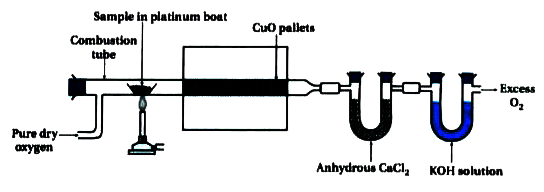Explain the principle and estimation method for carbon and hydrogen in organic compound
Carbon and hydrogen are estimated in one experiment.
Procedure: Apparatus are arrange according to figure. A known mass (m) of an organic compound taken in platinum boat is burnt in the presence of excess of oxygen and copper (II) oxide.

Reaction: carbon and hydrogen in the compound are oxidised to carbon dioxide and water respectively.
CxHy+(x+y4)O2→xCO2+y2H2O
Determine the amount of carbon and hydrogen: (i) The mass of water produced is determined by passing the mixture through a weighed U-tube containing anhydrous calcium chloride.
(ii) Then after, carbon dioxide is absorbed in another U-tube containing concentrated solution of potassium hydroxide
These tubes are connected in series (fig). The increases in masses of calcium chloride potassium hydroxide gives the amounts of water and carbon dioxide from which the percentage of carbon and hydrogen are calculated.
2H(2)CuO−−→H2O(18)→CaCl2→CaCl2(H2O) where, m1=H2O in gram
m= weight of compound
∴ Percentage of hydrogen =2×m1×10018×m
Carbon dioxide absorb in potassium hydroxide, so based on increase of weight (m2) percentage of carbon calculated.
∴ Percentage of carbon =m2×12×10044×m
where, C12gm+O2→CO244gm
m2= mass of produced CO2 in gram
m= mass of taken compound in gram
Topper's Solved these Questions
- BOOK - KUMAR PRAKASHANCHAPTER - ORGANIC CHEMISTRY SOME BASIC PRINCIPLES AND TECHNIQUESEXERCISE - Section A -Problem150videos
ORGANIC CHEMISTRY SOME BASIC PRINCIPLES AND TECHNIQUES
- BOOK - KUMAR PRAKASHANCHAPTER - ORGANIC CHEMISTRY SOME BASIC PRINCIPLES AND TECHNIQUESEXERCISE - Section A -Try Your Self-320videos
ORGANIC CHEMISTRY SOME BASIC PRINCIPLES AND TECHNIQUES
- BOOK - KUMAR PRAKASHANCHAPTER - ORGANIC CHEMISTRY SOME BASIC PRINCIPLES AND TECHNIQUESEXERCISE - Section -A (Qualitative Analysis of organic compounds)12videos
ORGANIC CHEMISTRY SOME BASIC PRINCIPLES AND TECHNIQUES
- BOOK - KUMAR PRAKASHANCHAPTER - HYDROGENEXERCISE - Section-D NCERT Exemplar (Long Answer)8videos
HYDROGEN
- BOOK - KUMAR PRAKASHANCHAPTER - QUESTION ASKED IN JEE -2018EXERCISE - MCQ10videos
QUESTION ASKED IN JEE -2018
Similar Questions
Knowledge Check
- Question 1 - Select One
Carbon and hydrogen are estimated in organic compounds by
AKjeldahl's methodBDuma's methodCLiebig's methodDCarius method - Question 2 - Select One
In the estimation of carbon and hydrogen present in an organic compound ,_____ is filled in the U- tube to absorb Water .
Aaqueous KOHBDry CuOCanhydrous CaCl2Ddry NaCl
Differentiate between the principle of estimation of nitrogen in an organic compound by (i) Dumas method and (ii) Kjeldahl’s method.
View SolutionDifferentiate between the principle of estimation of nitrogen in an organic compound by (i) Dumas method and (ii) Kjeldahl’s method.
View SolutionMath the following:
(a)Molecular mass of a volatile organic solid1.Silver salt method(b)Molecular mass of a nonvolatile organic solid2.Liebig method(c)Estimation of chlorine in carbon tetrachloride3.Platinichloride method(d)Estimation of nitrogen in aniline4.Victor Meyer's method(e)Equivalent mass of an organic acid5.Depression in freezing point(f)Equivalent mass of an organic base6.Carius method(g)Estimation of carbon and hydrogen in an organic compound7.Kjeldahl's methodView SolutionDescribe the principle involved in the estimation of phosphorus in an unknown organic compound.
View SolutionDescribe Duma's method for the estimation of nitrogen in an organic compound.
View SolutionMatch the following lists :
List 1 List 2
Property to be determined Method used for determination
( A ) Molecular mass of a volatile oragnic solid 1. Silver salt method
(B ) Molecular mass of anon-volatile organic solid 2. Liebig method
( C ) Estimation of chlorine in carbon tetrachloride 3. Platinichloride method
( D ) Estimation of nitrogen in aniline 4. Victor Meyer's method
( E ) Equivalent mass of an organic acid 5. Depression in freezing point
( F ) Equivalent mass of an organic base 7. Carius method
( G ) Estimation of carbon and hydrogen in an organic 7. Kjeldahl's method compound
Codes :View Solution

